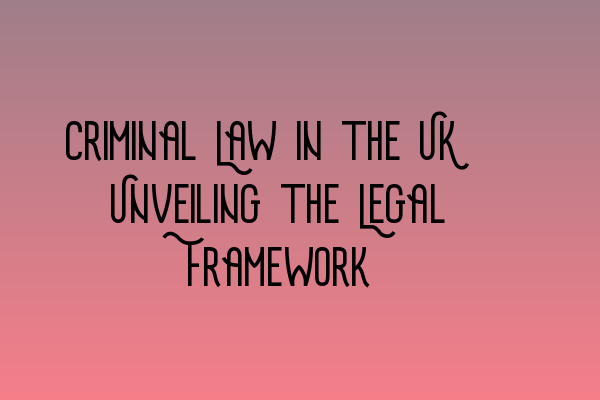Criminal Law in the UK: Unveiling the Legal Framework
When it comes to understanding the legal system in the United Kingdom, one area that captures the attention of many is criminal law. Criminal law forms an integral part of the UK’s legal framework, governing the consequences and punishment for various unlawful activities. In this blog post, we will delve into the intricacies of criminal law in the UK, shedding light on its key aspects and legal principles.
The Basics of Criminal Law
At its core, criminal law is concerned with defining and prosecuting acts that are considered criminal offenses. These offenses can range from minor infractions such as theft or drug possession to more serious crimes like murder, fraud, or assault. Understanding the legal framework that underpins criminal law in the UK is crucial for both legal professionals and individuals seeking clarity about their rights and responsibilities under the law.
The Legal System in the UK
The legal system in the UK is divided into three main components: England and Wales, Scotland, and Northern Ireland. While there are some differences in criminal law between these jurisdictions, there are also many similarities in terms of legal principles and the framework for dealing with criminal offenses.
In England and Wales, criminal law is primarily governed by common law, which is derived from judicial decisions. Additionally, statutes such as the Criminal Law Act 1977 and the Theft Act 1968 provide a statutory basis for criminal offenses. These statutes outline the elements of various crimes and the corresponding penalties.
Scotland, on the other hand, follows a mixed legal system incorporating elements of common law and civil law. Criminal law in Scotland is codified in the Criminal Procedure (Scotland) Act 1995, which sets out the rules and procedures for criminal cases.
Similarly, Northern Ireland has its own legal framework for dealing with criminal offenses. The Criminal Justice (Northern Ireland) Order 2008 is the primary statute governing criminal law in Northern Ireland.
The Role of Courts in Criminal Proceedings
Throughout the UK, criminal cases are heard and decided by courts of law. The court system is hierarchical, with different levels of courts handling different types of cases.
In England and Wales, the court hierarchy starts with the Magistrates’ Court, where less serious offenses are initially dealt with. More serious cases are escalated to the Crown Court, which has the authority to impose more severe penalties. The Court of Appeal and the Supreme Court are appellate courts that review cases on legal grounds.
In Scotland, the hierarchy begins with the Sheriff Court for less serious offenses and the High Court of Justiciary for more grave crimes. Appeals from the High Court of Justiciary are heard by the Court of Criminal Appeal in Scotland. Finally, the Supreme Court of the United Kingdom serves as the final appellate court for criminal cases in Scotland.
In Northern Ireland, the magistrates’ courts deal with minor offenses, while serious cases are referred to the Crown Court. The Court of Appeal in Northern Ireland and the Supreme Court of the United Kingdom handle appeals.
It is important for individuals involved in criminal proceedings to understand the structure of the court system and seek legal representation to navigate through the complexities of the legal process.
Legal Principles in Criminal Law
Several key legal principles underpin criminal law in the UK. These principles help ensure fairness, justice, and due process in criminal proceedings.
1. Presumption of Innocence: A fundamental principle in criminal law is that every individual is presumed innocent until proven guilty. This means that the burden of proof lies on the prosecution to establish the guilt of the accused beyond a reasonable doubt.
2. Standard of Proof: The standard of proof in criminal cases is “beyond a reasonable doubt.” This is a higher standard compared to the civil standard of “balance of probabilities.” The prosecution must present evidence that leaves no reasonable doubt about the guilt of the accused.
3. Right to Legal Representation: Every individual accused of a criminal offense has the right to legal representation. Legal aid may be provided to those who cannot afford legal counsel.
4. Right to a Fair Trial: The right to a fair trial is a fundamental aspect of criminal law. This includes the right to an impartial judge, the right to challenge and cross-examine witnesses, and the right to present a defense.
5. Principle of Double Jeopardy: The principle of double jeopardy prevents an individual from being tried again for the same offense after being acquitted or convicted. This principle aims to protect individuals from being subjected to multiple prosecutions.
These legal principles form the cornerstone of criminal law in the UK, ensuring that those accused of crimes are afforded their rights and receive a fair trial.
Expanding Your Knowledge
To further enhance your understanding of criminal law and its practice in the UK, we recommend exploring the following related articles:
- Workshops and Seminars on Criminal Practice: Expanding Your Expertise
- Updates in UK Criminal Laws: Staying Informed and Prepared
- Enhancing Your SQE Criminal Law Study Group Experience
- Decoding Criminal Evidence Rules: A Detailed Analysis
- Ensuring Rights of Victims in Criminal Procedures: Legal Protections and Support
By engaging with these resources, you can augment your knowledge of criminal law and stay informed about updates and developments in this ever-evolving field.
In conclusion, criminal law forms an essential part of the legal framework in the UK. Understanding its basics, the court system, and the key legal principles is crucial for both legal professionals and individuals seeking clarity about criminal offenses and the rights of the accused. By staying informed and continuously expanding your knowledge, you can navigate the complexities of criminal law with confidence and expertise.
